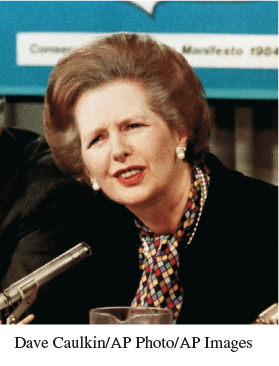A History of Western Society: Printed Page 996
A History of Western Society, Concise Edition: Printed Page 999
Chapter Chronology
Individuals in Society
Page 996

Margaret Thatcher as prime minister.
(Dave Caulkin/AP Photo/AP Images)
M argaret Thatcher, the first woman elected to lead a major European state, was one of the late twentieth century’s most significant political leaders. The controversial “Iron Lady” attacked socialism, promoted capitalism, and changed the face of modern Britain.
Raised in a lower-middle-class family in a small city in southeastern England, Thatcher entered Oxford in 1943 to study chemistry. She soon discovered a passion for politics and was elected president of student conservatives. Four years after her graduation, she ran for Parliament in 1950 in a solidly Labour district to gain experience. Articulate and attractive, she won the attention of Denis Thatcher, a wealthy businessman who drove her to campaign appearances in his Jaguar. Married a year later, the new Mrs. Thatcher abandoned chemistry, went to law school, gave birth to twins, and became a tax attorney. In 1959 she returned to politics and won a seat in that year’s Conservative triumph.
For the next fifteen years Thatcher served in Parliament and held various ministerial posts when the Conservatives governed. In 1974, as the economy soured and the Conservatives lost two close elections, a rebellious Thatcher adroitly ran for the leadership of her party and won. Five years later, as the Labour government faced rampant inflation and crippling strikes, Thatcher promised to reduce union power, lower taxes, and promote free markets. Attracting swing votes from skilled workers, the Conservatives gained a majority, and she became prime minister.
A self-described “conviction politician,” Thatcher rejected postwar Keynesian efforts to manage the economy, arguing that governments created inflation by printing too much money. Thus her government reduced the supply of money and credit and refused to retreat when interest rates and unemployment soared. Her popularity plummeted. But Thatcher remained in office, in part through an aggressive foreign policy. In 1982 the generals ruling Argentina suddenly seized the nearby Falkland Islands, home to 1,800 British citizens. A staunch nationalist, Thatcher detached a naval armada that recaptured the islands without a hitch. Britain admired Thatcher’s determination and patriotism, and she was re-elected in 1983.
Thatcher’s second term was the high point of her influence. Her commitment to privatization transformed British industry. More than fifty state-owned companies, ranging from the state telephone monopoly to the nationalized steel trust, were sold to private investors. Small investors were offered shares at bargain prices to promote “people’s capitalism.” Thatcher curbed the power of British labor unions, most spectacularly in 1984, when the once-mighty coal miners rejected more mine closings and doggedly struck for a year; the “Iron Lady” stood firm and beat them. This outcome had a profound psychological impact on the public, who blamed her for growing unemployment. Thatcher was also accused of mishandling a series of protest hunger strikes undertaken by the Irish Republican Army — in 1981 ten IRA members starved themselves to death in British prisons — but she refused to compromise with those she labeled criminals. As a result, the revolt in Northern Ireland entered one of its bloodiest phases.
Despite these problems, Thatcher was elected to a third term in 1987. Afterward, she became increasingly stubborn, overconfident, and uncaring. Working with her ideological soul mate, U.S. president Ronald Reagan, she opposed greater political and economic unity within the European Community. This, coupled with rising inflation, stubborn unemployment, and an unpopular effort to assert financial control over city governments, proved her undoing. In 1990, as in 1974, party stalwarts suddenly revolted and elected a new Conservative leader. The transformational changes of the Thatcher years nonetheless endured, consolidated by her Conservative successor, John Major, and largely accepted by the new Labour prime minister, the moderate Tony Blair, who served in office from 1997 to 2007.
- “Thatcherism” has become a shorthand label for the neoliberal ideologies that gained popularity in the 1970s and 1980s. How did the policies promoted by Thatcher’s government embody neoliberal ideas?
- Would you say that Thatcher was a successful British leader? Why or why not?
